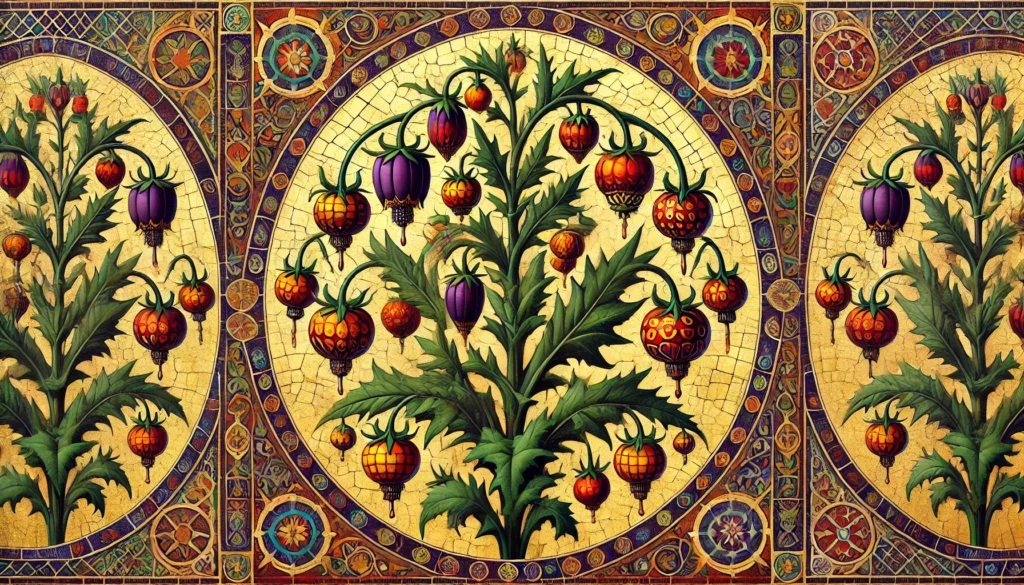

Home » Cat Plants » Deadly Nightshade Plant Dangers: How It Can Harm Your Cat?

Deadly nightshade (Atropa belladonna), also known as belladonna or devil’s berries, is a highly toxic plant that can be fatal to cats if ingested. This perennial herbaceous plant is native to Europe, North Africa, and Western Asia. It is commonly found in disturbed areas, along roadsides, and in waste places.
While cats are not typically allergic to deadly nightshade, its toxicity poses a severe threat to their health and well-being.
Ingestion may cause mild gastrointestinal upset, but is generally not life-threatening.
Ingestion can result in mild symptoms like vomiting, diarrhea, or drooling. Rarely fatal but may require veterinary care.
Eating these plants can lead to more pronounced symptoms like abdominal pain, lethargy, or difficulty breathing. Veterinary intervention may be necessary.
Ingesting even small amounts can cause severe symptoms like organ damage, seizures, or cardiac failure without rapid treatment.
All parts of these plants are extremely poisonous to cats and can quickly lead to death, even with immediate veterinary care.
** Please note: Please note that toxicity level can vary based on the amount ingested and the specific cat. It's always best to keep these plants completely inaccessible to cats and seek immediate veterinary care or call the poison hotline if you suspect your cat has ingested any part of a toxic plant.
If a cat ingests any part of the deadly nightshade plant, they may experience a range of symptoms. These can include:
If you suspect your cat has ingested deadly nightshade, it is crucial to seek veterinary care immediately. Your veterinarian will likely follow these steps to diagnose and treat your cat:

A: Yes, cats can be allergic to Deadly Nightshade. Symptoms of an allergic reaction may include itching, sneezing, and skin irritation.
A: Yes, Deadly Nightshade, also known as Belladonna, is highly toxic to cats. Ingesting any part of this plant can cause severe symptoms and can be fatal if not treated promptly.
A: Symptoms of Deadly Nightshade poisoning in cats include vomiting, diarrhea, excessive drooling, tremors, seizures, and difficulty breathing. Immediate veterinary care is crucial if ingestion is suspected.
A: To prevent contact, ensure that Deadly Nightshade is not present in your home or garden. Keep your cat indoors or monitor outdoor activities closely to avoid exposure.
A: If your cat ingests Deadly Nightshade, contact your veterinarian immediately. Do not induce vomiting unless instructed by a veterinary professional. Immediate medical attention is necessary.
A: Deadly Nightshade is more commonly found in wild areas rather than home gardens. However, if you do have this plant in your vicinity, it is important to ensure it is kept out of reach of cats to prevent accidental ingestion.
Deadly nightshade has a long and fascinating history. The plant has been used for centuries in traditional medicine, but its toxic properties have also been well-known. In ancient times, it was used as a poison and a hallucinogen. The name “belladonna” comes from the Italian phrase “beautiful woman,” as it was once used in eye drops to dilate women’s pupils, which was considered attractive.
Despite its dangerous nature, deadly nightshade has been used in various medicinal applications, such as treating pain, inflammation, and muscle spasms. However, due to its high toxicity, its use is strictly regulated, and it should never be consumed without medical supervision.
Please note: The information shared in this post is for informational purposes only and should not be considered as veterinary medical advice.
🐾 A hilarious or heart-melting cat video
🐾 Our latest paws-on review of a cool cat toy